Curtains for Zardari?
By Hussain Dada | Cover Story | Published 6 years ago
The last month witnessed a flurry of activities involving the National Accountability Bureau (NAB) — including the filing of three references and a string of arrests — in regard to the fake bank accounts and money laundering case.
As evidenced by these events, the NAB now seems set on rounding up the big fish, the small fry, as well as some carrion. Those in this list include business magnates, such as Omni Group patriarch Anver Majid and his son A.G. Majid, former Summit Bank chief and Karachi Stock Exchange (KSE) chairman Hussain Lawai, businessman Younus Kidwai, sugar mill owner Dinshaw Anklesaria, and Nadeem Hakim Mandviwalla. Bankers have also been picked up, including the relationship managers of one of the banks where these fake accounts were opened. Then there are the “minions,” as referred to by the joint investigation team (JIT), small-time employees who either served as cash mules or, unbeknownst to them, had bank accounts opened in their names that were used to transfer large sums of money.
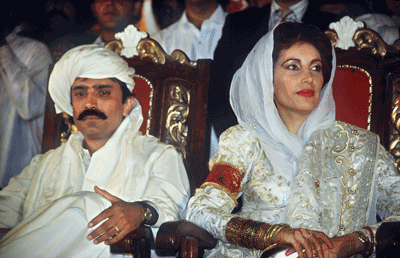 For the investigators, though, the whale in this ocean of ill-begotten gains is the former president, Asif Ali Zardari.
For the investigators, though, the whale in this ocean of ill-begotten gains is the former president, Asif Ali Zardari.
NAB contends it has a strong case, equipped as it is with the JIT report with its recommendation of filing 16 references in the case, with Zardari and his sister Faryal Talpur among the accused in multiple cases.
Zardari has brushed aside the idea that there is a case against him, or that it is illegal to have ‘benami accounts.’ He claims it is common practice in the business community and has raised questions about the NAB’s legality and methods, using the recurring refrain of it being a “black law” used by autocrats for purposes of political expediency. He has also alluded to parallels between himself and Nawaz Sharif, who went through a similarly protracted trial before being convicted on a technicality.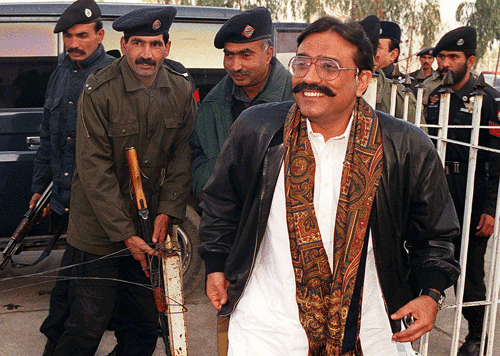
The NAB is certain that it will get Zardari, despite his confidence. While following a money trail and proving white-collar crimes requires a meticulous investigation over a prolonged period, and depends heavily on collaboration with associated individuals/companies and agencies, the bureau says it has collected enough evidence to expose the scam.
In March this year, after a series of delays, a banking court transferred the fake accounts case from Karachi to NAB Rawalpindi. Since then, there has been a visible upswing in the case.
However, the question lingers, is there enough substance in the JIT report to put Zardari in the dock?
The joint investigation team report is exhaustive and implicates the core leadership of the Pakistan Peoples Party (PPP), industrialists and businessmen, government contractors and bureaucrats, including Zardari himself. The report, filed just before the start of the year, recommended the filing of 16 references against them.
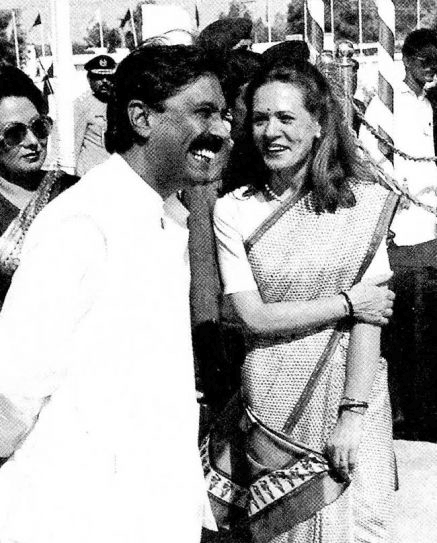 It took a while for the first reference to be filed – against KMC and KDA officials and businessman Younus Kidwai – and the bureau has since filed two more references. It has also reportedly recovered Rs 600 million from Kidwai, which would make it the first recovery in the multi-billion rupee scam.
It took a while for the first reference to be filed – against KMC and KDA officials and businessman Younus Kidwai – and the bureau has since filed two more references. It has also reportedly recovered Rs 600 million from Kidwai, which would make it the first recovery in the multi-billion rupee scam.
But this is just one of the 16 references recommended by the JIT, which started with the identification of 11,500 bank accounts and 924 account holders at the start of the investigation.
It reviewed close to 25,000 transactions flagged as suspicious, the majority of them involving cash. In order to focus the investigation, a threshold of Rs 10 million – one crore rupees – was set as the threshold to follow the transaction. The JIT also identified 32 bank accounts in the name of 11 fictitious companies that were allegedly used to launder close to Rs 30 billion.
Out of these 32 accounts, 15 were opened in three branches of Summit Bank, which was the first reference recommended by the JIT. The JIT contends the bank was acquired “through bank capture” by Hussain Lawai for the explicit purpose of money laundering. The bank was also involved in giving out imprudent loans – along with the National Bank of Pakistan (NBP) and Sindh Bank – to the Omni Group and its associated businesses, as well as illegal adjustment lending, the fraudulent evaluation of collateral and restructuring of loans.
It also identified cash deposits of Rs 2.6 billion in these accounts, while Rs 7.17 billion had been withdrawn, and in the majority of cases, the numbers of the identity cards of the individuals, carrying out the transactions were not noted, thus masking the identities of those people. Some benami accounts were also operated at Sindh Bank, United Bank, Faysal Bank and Muslim Commercial Bank (MCB), which, as in the other banks, had vouchers missing, indicating complicity.
The investigation found that Rs 438 million was deposited by “cash-boys” in front companies allegedly belonging to the Omni Group, in an attempt to mix the proceeds of crime with legitimate business dealings.
In another recommended reference against the Omni Group, the report states that it grew by a phenomenal 2,500 per cent during the five years of the PPP’s provincial government, from 2013-2018. The number of companies under its umbrella grew from six in 2008 to 77 in 2018, including 31 front companies in the names of its “minions,” along with 11 fake entities in the names of which fake accounts were opened.
The report maps out the Omni Group’s acquisition of sugar mills from the Sindh government at throwaway prices – including Thatta and Dadu Sugar Mills – with the alleged complicity of the then provincial finance minister, Syed Murad Ali Shah. The group also acquired a loan of Rs 895 million for the mills. The report cites the revised asset declaration of members of the Majid family, including Anver Majid, who also declared the fake bank accounts opened in the name of six of the 11 identified companies.
During the investigation, it was revealed that most of these fake accounts had the ‘International Business and Shipping Centre (ISBC)’ as their registered address. The ISBC is owned by M/s Park Lane, which lists Zardari and Bilawal as beneficiary owners.
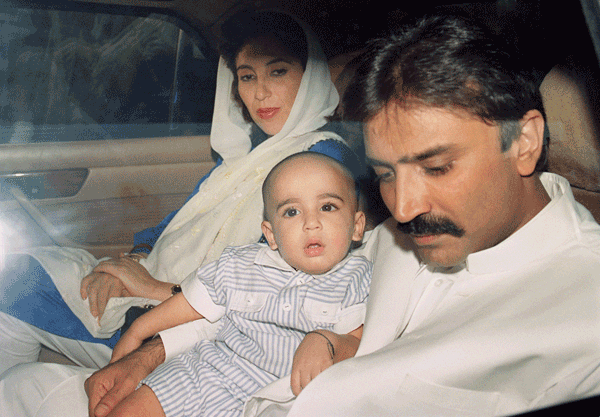
The same Park Lane also entered into a controversial joint venture with M/s Parthenon, controlled by Park Lane shareholder and director, Younus Kidwai, which involved the misappropriation of Rs 1.5 billion — a transaction for which Zardari allegedly misused his authority as president of Pakistan.
Parthenon received Rs 266 million from Bahria Town – which, according to the investigation, were kickbacks – for the allotment of amenity plots. One of the three references filed by NAB pertain to this case. Furthermore, the report contends that over Rs 10 billion were transferred into fake bank accounts from accounts belonging to individuals associated with Bahria Town.
The next recommended reference pertains to Bakht Tower, the allotted area of which “inexplicably increased from 3,832 to 4,000 square yards,” according to the report. It also alleges the involvement of Anver Majid, acting on a power of attorney, to push the deal through a front man.
Another reference deals with using proceeds from fake accounts for personal expenses, including those involving Bilawal Bhutto-Zardari, Faryal Talpur and other members of the family.
The JIT report highlights in particular, the case of the payment of duty on luxury import vehicles, which investigators believe to be an open-and-shut case. The vehicles were also not declared in the asset declaration made to the election commission for the 2018 election.
The investigators are also looking into what the report describes as the case of the “hyper growth of Bahria Town South with the collusion of the Sindh government and the kickbacks received by Zardari and Talpur through fake accounts,” including the transfer of Rs 45 million into the account of a fake entity, from the personal account of real estate tycoon and Bahria Town owner, Malik Riaz Hussain.
Then there is the Opal Group, a joint venture of Bahria Town and the Zardari Group, in which over Rs 1.16 billion was deposited from Bahria Town accounts, and another half-billion rupees in deposits made by others, including prominent contractors of the Sindh government.
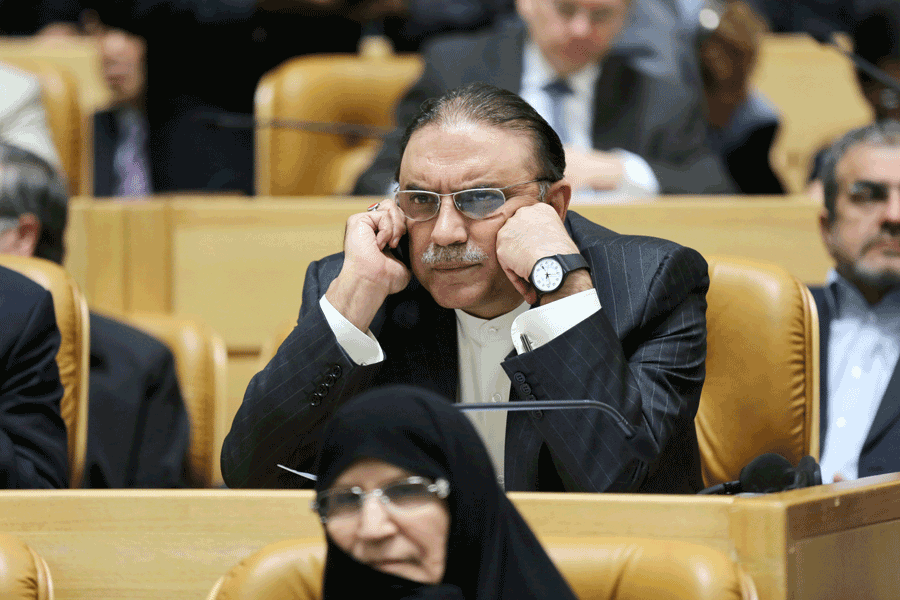
According to cynical observers, the idea is to deplete the PPP, by placing its core leadership behind bars, similar to the template ostensibly followed for the PML-N and Sharif brothers. This, they say, would reduce the opposition to the state of a headless chicken, paving way for early elections and possible one-party rule with Imran at the helm, his strings pulled, they contend, by the ‘masters’ who installed him.
Bahria Town is also accused of giving kickbacks for the Icon Twin Tower project in Karachi, in which Dinshaw Anklesaria and Mushtaq Ahmed were front men. According to the report, Zardari holds 50 per cent of the shares of the project through Galaxy International, which is owned by Anklesaria. It is also the company in whose names the plots that were transferred to Bahria for the project, were held, and against which kickbacks of around Rs 10 billion were given.
Furthermore, the report highlights cases of misdeclaration of assets by Faryal Talpur, misappropriation through government subsidies, and the misappropriation of 362 acres of land belonging to Pakistan Steel Mills (PSM), among others. Additionally, it makes money laundering allegations against Orient Energy and Technomen Kinetics – through the “havala and hundi” method – which were awarded dubious government contracts to launder money abroad. The report lists undeclared assorted international assets of members of the Zardari and Majid family, that are worth hundreds of millions of dollars.
The JIT allegations, however, do not have any legal validity. The onus is now on the NAB to prove all the charges against Zardari, his family members and cohorts, in an accountability court. In the process, the anti-corruption watchdog has to contend with its growing notoriety as a tool of the powers-that-be, for selective accountability and political victimisation, courtesy the harsh and relentless campaign by opposition parties.
The challenges of proving white-collar crime, given the questionable ability of our investigators to connect the dots of such an elaborate web of intrigue and deception, are daunting. The majority of investigations based on confessions, often extracted under severe duress, are easy to repudiate by competent defence attorneys in court, as being illegal.
Faqeer Muhammad, who was a senior investigator with the FIA and the NAB, lauded the JIT for its timely review and analysis of available data to identify patterns and establish the nexus of crime. He says the investigation should focus on regulatory violations to establish collusion. “Summit Bank violated the regulations of the Security and Exchange Commission of Pakistan (SECP) and the State Bank of Pakistan (SBP), but got away without any penalties,” says Muhammad.
He added that there was enough evidence against Zardari, including the payment of import duties on vehicles from fake bank accounts, but added that it would pose a challenge for investigators to prove that the payment came from the proceeds of crime. Similarly, regarding money laundering, Muhammad said that as it is a predicate offence, the investigators need to first prove that the laundered money was acquired illegally, failing which it would be treated as tax evasion.
Accountability is something Prime Minister Imran Khan has staked his reputation on. One of his major campaign promises was to crack down on corruption and money laundering and bring back the country’s looted wealth. Citing a report of the US State Department, he has often claimed in public gatherings and speeches that $10 billion are laundered from Pakistan annually. And he has routinely accused Zardari and the Sharifs of being the architects of this network.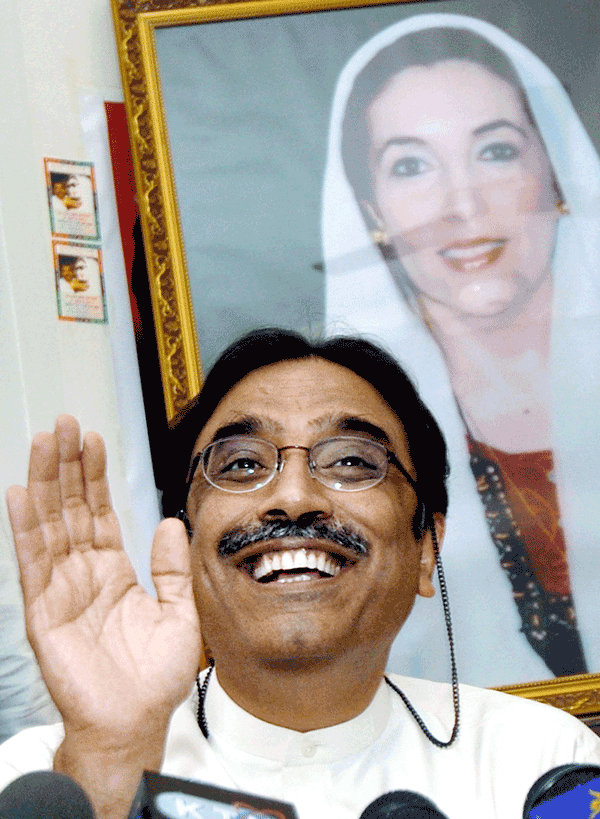
Now, with the entire state apparatus at its disposal – and the judiciary allegedly willing to work in tandem with it – if the government fails to prove Zardari’s involvement beyond a shadow of doubt, it will come as a blow to the prime minister’s already waning reputation.
It will also be a major hindrance in the purported endgame of the prosecution. According to cynical observers, the idea is to deplete the PPP, by placing its core leadership behind bars, similar to the template ostensibly followed for the PML-N and Sharif brothers. This, they say, would reduce the opposition to the state of a headless chicken, paving way for early elections and possible one-party rule with Imran at the helm, his strings pulled, they contend, by the ‘masters’ who installed him. n


